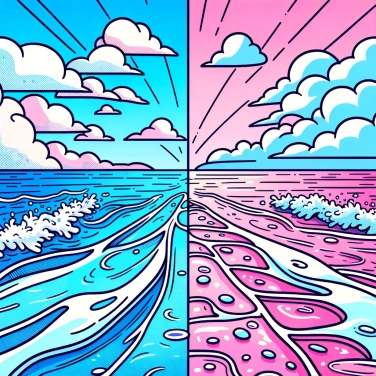The oceans are salty because they accumulate salts from rivers and volcanoes. Lakes, on the other hand, do not have a direct connection to the oceans and therefore do not receive salt, remaining fresh.

The salt in the oceans primarily comes from land rocks. Over time, rain and rivers wear down these rocks, which contain numerous minerals, including salt, mainly in the form of sodium ions and chloride ions. These minerals slowly dissolve and then travel through rivers to the oceans. Since the oceans have no real outlet, salts accumulate, gradually concentrating over millions of years. Added to this is underwater activity: underwater volcanoes and hydrothermal vents also enrich the water with other minerals, contributing in their own way to the salty marine cocktail.
Oceans continuously receive fresh water through precipitation and river inflows. The thing is, only water evaporates due to the sun's heat, leaving behind mineral salts. This repeated cycle of evaporation gradually concentrates salt in the oceans. In contrast, lakes, usually fed but also drained by rivers, continuously renew their water, preventing salts from surrounding rocks from accumulating as much. That’s why the majority of lakes remain low in salinity or even completely fresh.
Lakes can generally remain freshwater because they have a natural drainage system. Basically, the water feeding a lake will eventually flow into rivers or infiltrate the soil, carrying with it the accumulated mineral salts. Additionally, aquatic organisms and local plants consume some of these minerals to grow, which further decreases the saline concentration. Unlike lakes, oceans gradually accumulate these salts because they do not have a continuous drainage system outward. Some lakes are not so fortunate: when their water evaporates faster than it flows out, the salts become so concentrated that they turn into saline lakes.
Natural salinity changes according to cycles where climate, rainfall, and droughts play key roles. When it rains a lot, salinity decreases somewhat because rainwater dilutes the salts present. Conversely, during prolonged droughts, evaporation is intense, and thus the concentration of salt increases in certain environments, especially closed lakes.
We also intervene quite a bit at our level. Certain human activities, such as intensive agriculture, release mineral salts into the soils, which eventually runoff into groundwater or rivers. The massive use of chemical fertilizers, as well as deforestation and poorly managed irrigation, increase the amounts of salt in nearby lakes or waterways. In contrast, in the oceans, these human effects remain low compared to the immense volume of water that maintains a relatively stable salinity.
Some lakes can be salty if they have no outlet or drainage, like the Great Salt Lake in Utah or Lake Natron in Tanzania. These lakes accumulate mineral salts brought in by tributaries and concentrated through evaporation.
Every year, rivers and streams bring millions of tons of mineral salts to the oceans, thus continuously contributing to their salinity.
Contrary to a common belief, the salt in the oceans is not solely composed of sodium chloride (table salt). It also contains various other minerals, such as magnesium, calcium, and potassium.
Although most marine fish are adapted to saltwater, some fish, like salmon, spend part of their lives in freshwater before returning to the oceans, demonstrating an incredible adaptability to different levels of salinity.
Some lakes are referred to as "saline lakes" because they have no outlet. Without outflow, water evaporates more quickly, leading to the gradual accumulation of salt and resulting in high salinity.
No, ocean salinity remains relatively constant due to various natural mechanisms such as the deposition of minerals in solid form on the ocean floor, the consumption of salts by various marine organisms, and their constant renewal through the erosion of continental rocks.
The Atlantic Ocean is often considered the saltiest, particularly due to high evaporation rates in the tropics and the limited input of fresh water from rivers compared to other oceans.
Drinking saltwater can accelerate dehydration, as the kidneys use more water to eliminate the excess salt, leading to a net loss of body water and thus increased dehydration.
Seawater generally requires a complex and energy-intensive process called desalination to become drinkable. This process includes reverse osmosis or thermal distillation, which are rarely easily accessible on a small scale.

No one has answered this quiz yet, be the first!' :-)
Question 1/5